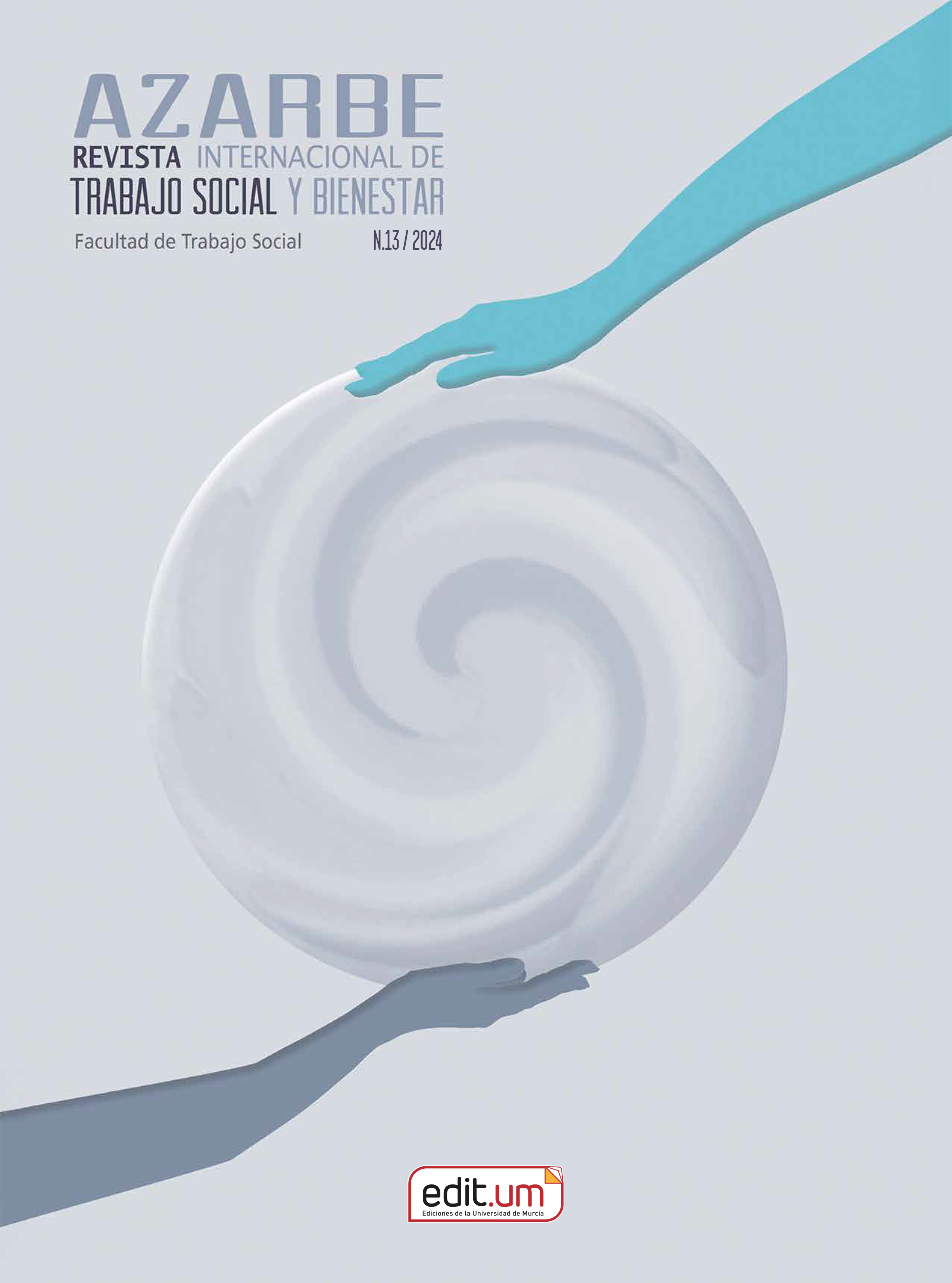“Vístete como quieras, actúa como quieras”. Trayectorias, experiencias y redes de apoyo entre una muestra de personas trans
Abstract
The purpose of this research was to explore the situation of transgender people in Spain, focusing on the analysis of their trajectories and identity experiences, as well as the role played by family, friends and associations throughout this process. To this end, qualitative research was carried out with 13 transgender people. Semi-structured interviews were used and a content analysis was carried out using the phenomenological approach. Among the main results found, it is worth highlighting that the family and peer group are essential references for trans people. In particular, having their support and recognition can be fundamental during the process of identity construction. Within friendships, it is important to point out that many of the people interviewed value their LGTB friends positively. We conclude the importance that professionals, such as social workers, can have in direct and indirect intervention with transgender people to improve their emotional well-being, as well as an advance towards social justice.
Downloads
-
Abstract347
-
pdf (Español (España))223
References
Abreu, R., Rosenkrantz, D., Ryser-Oatmen, J., Rostosky, S., & Riggle, E. (2019). Parental reactions to transgender and gender diverse children: A literature review. Journal of GLBT Family Studies, 15(5), 461-485. https://doi.org/10.1080/1550428X.2019.1656132
Agencia de los Derechos Fundamentales de la Unión Europea (2015). Ser «trans» en la UE : análisis comparativo de los datos de la encuesta a personas LGBT en la UE : resumen, Oficina de Publicaciones. Recuperado de https://data.europa.eu/doi/10.2811/105227
Argüello, T. (2022). LGBTQ+ Affirmative practice in social work. En L. Rapp-Mc Call, K. Corcoran, & A. Roberts (eds.) Social Workers’ Desk Reference (77-83). Oxford
Austin, A., Craig, S.L., & McInroy (2016). Toward transgender affirmative social work education. Journal of Social Work Education, 52(3), 297-310. https://doi.org/10.1080/10437797.2016.1174637
Bariola, E., Lyons, A., Leonard, W., Pitts, M., Badcock, P., & Couch, M. (2015). Demographic and psychosocial factors associated with psychological distress and resilience among transgender individuals. American Journal of Public Health, 10(1), 2108-2116. https://doi.org/10.2105/AJPH.2015.302763
Barron, C., & Capous-Desyllas, M. (2017). Transgressing the gendered norms in childhood: understanding transgender children and their families. Journal of GLBT Family Studies, 13(5), 407-438. https://doi.org/10.1080/1550428X.2016.1273155
Bower-Brown, S., Zadeh, S., & Jadva, V. (2023). Binary-trans, non-binary and gender-questioning adolescents’ experiences in schools. Journal of LGBT Youth, 20(1), 74-92. https://doi.org/10.1080/19361653.2021.1873215
Bregman, H., Malik, N., Page, M., Makynen, E., & Lindahl, K. (2013). Identity profiles in lesbian, gay, and bisexual youth: the role of family influences. Journal of Youth, 42(3), 417-430. https://doi.org/10.1007/s10964-012-9798-z
Cavia, B. (2019). La gestión de lo patológico. Estudios Atacameños, 62, 223-245
De Vries, D., Peter, J., de Graaf, H., & Nikken, P. (2016). Adolescents’ social network site use, peer appearance-related feedback, and body dissatisfaction: testing a mediation model. Journal of Youth and Adolescence, 45(1), 211-224. https://doi.org/10.1007/s10964-015-0266-4
Etxebarría Pérez de Nanclares, O., Vizcarra Morales, M.T., Gamito-Gómez, R., & López-Vélez, A.L. (2023). Trans reality in the educational system: A systematic review. Revista de Psicodidáctica, 28(2), 104-114. https://doi.org/10.1016/j.psicod.2022.12.002
Evans, I. & Rawlings, V. (2021). “It was just one less thing that I had to worry about”. Positive experiences of schooling for gender diverse and transgender students. Journal of Homosexuality, 68(9), 1489-1508. https://doi.org/10.1080/00918369.2019.1698918
FELGTB (2020). Jóvenes trans en el sistema educativo. https://felgtbi.org/wp-content/uploads/2020/09/Informe-menores-trans_FELGTB_2019.pdf
Gallardo, E. y Espinosa, M. (2019). La creatividad de género frente al sistema sexo-genérico: voces de niñxs y adolescentes trans. Revista sobre la infancia y adolescencia, 17, 21-39.https://doi.org/10.4995/reinad.2019.11770
González-Mendiondo, L., & Moyano, N. (2023). Teachers dealing with non-conformity: Development of the attitudes toward childhood gender identity questionnaire for educational settings. International Journal of Educational Research, 119. https://doi.org/10.1016/j.ijer.2023.102178
González-Mendiondo, L., Moyano, N. y Mayor, A. (2024). Acompañar la transexualidad desde la escuela: un estudio cualitativo con las familia. Revista de Psicodidáctica, 29(1), 78-85. https://doi.org/10.1016/j.psicod.2023.08.001
Horton, C. (2023). Gender minority stress in education: Protecting trans children’s mental health in UK schools. International Journal of Transgender Health. https://doi.org/10.1080/26895269.2022.2081645
Kia, H., Kenney, K., Ross Mackinnon, K., Abramovich, A., Salway, T., Ferlatte, O., Knight, R., Charles, G., & Marshall, S.K. (2023). “It saves lives”: Peer support and resilience in transgender and gender diverse communities. SSM Qualitative Research in Health, 3 (10). https://doi.org/10.1016/j.ssmqr.2023.100264
Missé, M. y Parra, N. (2023). Adolescentes en transición. Pensar la experiencia de género en tiempos de incertidumbre. Edicions Bellaterra
Olson, K., Durwood, L., DeMeules, M., & McLaughlin, K. (2016). Mental health of transgender children who are supported in their identities. Pediatrics, 137(3). https://doi.org/10.1542/peds.2015-3223
Paechter, C., Toft, A., & Carlile, A. (2021). Non-binary young people and schools: pedagogical insights from a small-scale interview study. Pedagoy, Culture and Society, 29(5), 695-713. https://doi.org/10.1080/14681366.2021.1912160
Rilsey, E.A., Sitharthan, G., Clemson, L., & Diamond, M. (2011). The needs of gender-variant children and their parents: A parent survey. International Journal of Sexual Health, 23(3), 181-195. https://doi.org/10.1080/19317611.2011.593932
Selkie, E., Adkins, V., Masters, E., Bajpai, A., & Shumer, D. (2020). Transgender Adolescents’ Use of social media for social support. Journal of Adolescent Health, 66(3), 275-280. https://doi.org/10.1016/j.jadohealth.2019.08.011
Simons, L., Schrager, S., Clark, L.F., Belzer, M., & Olson, J. (2013). Parental support and mental health among transgender adolescents. Journal of Adolescent Health, 53(6), 791-793. https://doi.org/10.1016/j.jadohealth.2013.07.019
Sorlie, A. & Suess, A. (2017). Democratising diagnoses? The role of the depathologisation perspective in constructing corporeal trans citizenship. Critical Social Policy, 38(1), 11-34. https://doi.org/10.1177/0261018317731716
Stanton, M., Ali, S., & Chaudhuri, S. (2017). Individual, social and community-level predictos of wellbeing in a US sample of transgender and gender non-conforming individuals. Culture, Health and Sexuality, 19(1), 32-49. https://doi.org/10.1080/13691058.2016.1189596
Suess, A. (2020). La perspectiva de despatologización trans. Una aportación para enfoques de salud pública y prácticas clínicas en salud mental. Informe SESPAS 2020. Gaceta Sanitaria, 34(1), 54-60. https://doi.org/10.1016/j.gaceta.2020.07.002
Valentine, S. & Shipherd, J. (2018). A systematic review of social stress and mental health among transgender and gender non-conforming people in the United States. Clinical Psychological Review (66), 24-38. https://doi.org/10.1016/j.cpr.2018.03.003
Copyright (c) 2024 AZARBE, International Journal of Social Work and Welfare

This work is licensed under a Creative Commons Attribution-NonCommercial-NoDerivatives 4.0 International License.
Las obras que se publican en esta revista están sujetas a los siguientes términos:
1. El Servicio de Publicaciones de la Universidad de Murcia (la editorial) conserva los derechos patrimoniales (copyright) de las obras publicadas, y favorece y permite la reutilización de las mismas bajo la licencia de uso indicada en el punto 2.
2. Las obras se publican en la edición electrónica de la revista bajo una licencia Creative Commons Reconocimiento-NoComercial-SinObraDerivada 3.0 España (texto legal). Se pueden copiar, usar, difundir, transmitir y exponer públicamente, siempre que: i) se cite la autoría y la fuente original de su publicación (revista, editorial y URL de la obra); ii) no se usen para fines comerciales; iii) se mencione la existencia y especificaciones de esta licencia de uso.
3. Condiciones de auto-archivo. Se permite y se anima a los autores a difundir electrónicamente las versiones pre-print (versión antes de ser evaluada) y/o post-print (versión evaluada y aceptada para su publicación) de sus obras antes de su publicación, ya que favorece su circulación y difusión más temprana y con ello un posible aumento en su citación y alcance entre la comunidad académica. Color RoMEO: verde.














